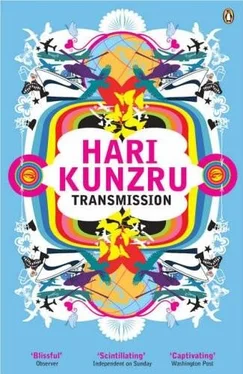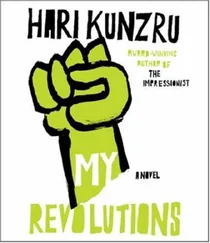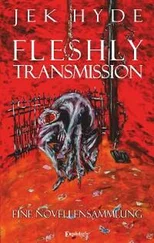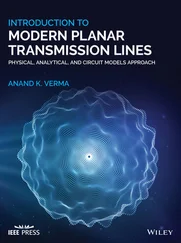Guy had bought his place at the height of the late-nineties boom. As Tomorrow * took off, he felt it appropriate that as CEO of a world-class agency, he should have a world-class pad. There were other factors which influenced his decision. He sometimes suspected, though he could never be sure, that the apartment was one of the reasons Gabriella agreed to move in with him. Sometimes he even suspected that subconsciously the main reason he bought it was to persuade Gabriella to move in with him. It was a psychological area which would not repay close scrutiny. The price of course was astronomical, but at the time it had seemed worth taking on the debt just to see the look of envy on the faces of his contacts when he invited them over for the housewarming.
Though Guy was a millionaire, it was in a rather technical sense. While his picture in Future Business magazine’s list of the 100 Top Young Entrepreneurs of the Next Millennium was printed next to a ‘personal worth’ figure of £3.1 million, almost all of this was based on a valuation of Tomorrow *, in which, after the last round of venture capital funding, Guy now held a reduced stake. His liquid assets were relatively modest. At the time he had rationalized the purchase of the apartment as a networking opportunity. Surely in the corridors of such an exclusive place, he would bump into all sorts of potential clients.
To his disappointment he found when he moved in that the complex was eerily deserted. The facilities, while beautifully maintained, were little used. Though most units were allocated before the development was even complete, many were owned by foreign nationals and remained unoccupied for much of the year. Others were company flats, or corporate lets whose occupants changed every few weeks. When Guy met residents of In Vitro in the gym, they nodded warily and tried to hide their surprise at encountering another person in this normally empty place. The sauna heated and cooled untenanted, and in the meditation space the coyotes cried unheard. Early in the morning, before the European markets opened, a few people could be found swimming laps of the pool, but they were usually strangers to one another. In the lifts, occupants fixed their gaze on the flickering digits of the LCD display. Sometimes they sneaked glances at the faces reflected in the polished steel doors. Sometimes they did not.
He paid the driver, and a concierge came out with an ice-white In Vitro umbrella, which he held over Guy’s head as he made his way into the atrium. The concierge wheeled his case over the tarmac and asked if he had enjoyed his journey. Like all the front-desk staff at In Vitro, this one had an unidentifiable Eastern European accent. Guy disliked it. Eastern Europe did not say customer service to him.
Inside the atrium a pair of crew-cut men sat on swivel chairs watching a bank of video monitors. The security post was ‘dramatized’, as the Pelham Partnership put it, by being located inside a giant glass oval, reminiscent of an eye, suspended at mezzanine level over the front desk. The development’s blanket electronic surveillance was a major selling point for its corporate clients. Landings, stairwells, gardens, riverside — everything was covered. The oval was intended to be reassuring, a symbol of safety, but lately Guy had found the bored men and their constantly shifting panoptical views were having the opposite effect. He tended to walk a little faster as he passed beneath the smoked-glass camera domes in the car park. Fitting his key into his front door, he felt furtive. Closing it behind him was a guilty relief.
He ignored the concierge’s parting salute and took the lift up to the fifth floor. As usual the landing was deserted, unless you counted the quasi-human presence of the glossy yucca trees which stood sentinel by each door. Inside, No. 124 smelt unpleasantly of cigarette smoke. A trio of empty Moët bottles and a dirty ashtray stood on the Corian worktop in the kitchen, Gabriella had obviously been entertaining. Shedding his clothes on the bedroom rug, Guy stepped into the shower and stood for a full ten minutes under a transforming blast of hot water. Then he shaved, selected clean clothes from his steel-fronted wardrobe and padded barefoot back across the slate tiles into the kitchen to make coffee at his vast espresso machine, an activity which always gave him a satisfying engine-driverly buzz.
Guy had known even before he moved in that this was a living space which would require something extraordinary. Feeling both time-and knowledge-challenged, he had (at the suggestion of the attractive brunette property consultant) employed an agency to help him buy furniture. That way, he reasoned, he could be certain everything about his personal environment was in the best possible taste. And so the white leather table with the cutout airport city-code motif, the chandelier made from ceramic castings of compact discs, the vicuña pouffe, the Danish ergonomie salad servers and disposable cardboard fruit bowls, the nest of matt-black powder-lacquered steel cubes by the conversation pit, the cable-suspended Vuitton-print polyvinyl vanity unit on which he had mounted the plasma screen and electrostatic speaker-array, the knitted ornamental pods on the bedroom ceiling and the low-rise smuggled-teak patio furniture on the balcony — all of it was personalized, individual, signature. It was all, every sandblasted bathroom tap of it, him.
The art had been easiest to choose. At an online gallery (another suggestion from Tania the property consultant) he had clicked on several Cibachrome prints of blown-up urban detailing, manholes and rough sleepers and pigeons and so on, plus a cross-processed shot of an industrial estate in Dalston where he had once been to a launch. Enjoying himself, he had also bought a couple of wall-plaques made out of neon tubing and a sculpture consisting of two interlocking steel circles, based, said the site, on the dimensions of a particular supermodel’s head.
He slid open the glass doors and sipped his doppio, looking out at the Thames. Traffic flowed over the bridges. A refuse barge went past, headed for a downriver landfill site. As usual, though he loved the view, he found himself thinking how much better it would be from higher up. On the upper storeys of In Vitro were some spectacular penthouses, and at its summit was a single two-storey glass-walled cube with a floating platform floor, an undecorated shell which the developers had yet to sell. Sometimes, catching sight of the building from a distance, Guy imagined himself up in that penthouse, raking all of London with his gaze.
A few drops of rain landed on his face. As he finished his coffee, his phone rang, playing the hook from a 1980s soft-rock tune. Like his occasional visits to greasy-spoon cafés, his collection of John Holmes videos, his current haircut and the posters of state-socialist leaders in the dining area, Guy’s ringtone was ironic. The caller was Kika, his PA.
‘Guy?’
‘Kika, hi.’
‘How did New York go?’
‘They loved it, Kika. Really positive. Their communications VP was totally blown away.’
‘That’s great news. So we’ve got the account?’
‘They haven’t committed as yet, but they will. Believe.’
‘Oh, I see.’ She sounded sceptical, which annoyed him.
‘Guy,’ she asked, ‘are you coming into the office?’
‘Kika, I’m kind of wiped out. I just walked through the door a few minutes ago. Did something come up?’
‘Perhaps. Maybe it’s not important, but I think you should know Yves Ballard is here. And he’s sort of — inspecting things.’
This was bad news. Guy looked behind him at his living area, subconsciously scanning for something to sniff or swallow to counteract it. ‘Yves? What the hell is he doing in the office? I didn’t even know he was in London. And what do you mean inspecting things?’
Читать дальше











